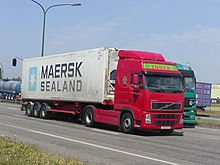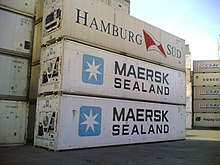This article needs additional citations for verification. (December 2009) |





A refrigerated container or reefer is an intermodal container (shipping container) used in intermodal freight transport that is capable of refrigeration for the transportation of temperature-sensitive, perishable cargo such as fruits, vegetables, meat, fish, seafood, and other similar items.
While a reefer will have an integral refrigeration unit, they rely on external power, from electrical power points (“reefer points”) at a land-based site, a container ship or on quay. When being transported over the road on a trailer or over rail wagon, they can be powered from diesel powered generators ("gen sets") which attach to the container whilst on road journeys. Refrigerated containers are capable of controlling temperature ranging from −65 °C (−85 °F) up to 40 °C (104 °F).[1]
Some reefers are equipped with a water cooling system, which can be used if the reefer is stored below deck on a vessel without adequate ventilation to remove the heat generated.[2]
Water cooling systems are more expensive than air current ventilation to remove heat from cargo holds, and the use of water cooling systems is declining.[1] Air cooling and water cooling are usually combined.
The impact on society of reefer containers is vast, allowing consumers all over the world to enjoy fresh produce at any time of year and experience previously unavailable fresh produce from many other parts of the world.
- ^ a b "Bewaking temperatuur tijdens transport van levensmiddelen over grote afstanden. (NL)". Innotact Consulting B.V. October 2008. Retrieved 2015-06-30.[permanent dead link]
- ^ "Reefer container meaning and definition". Alconet Containers. Retrieved 23 April 2018.